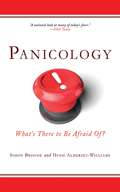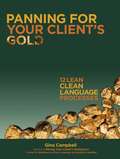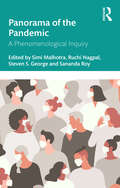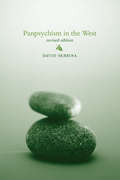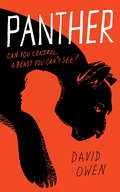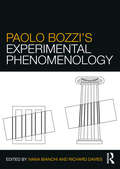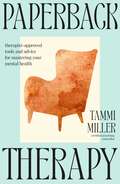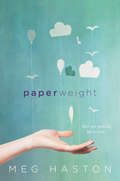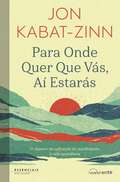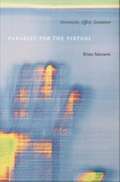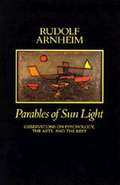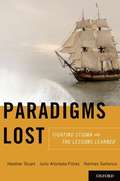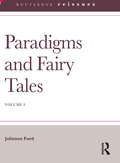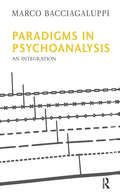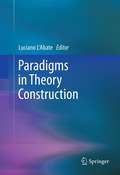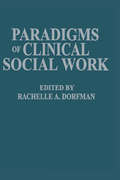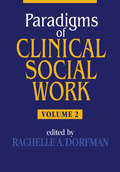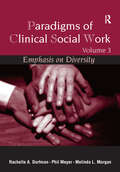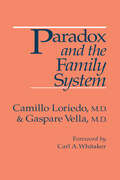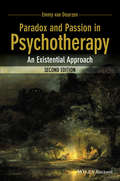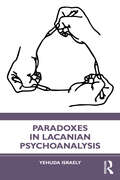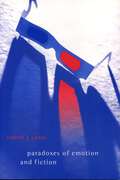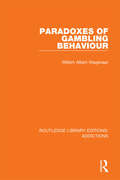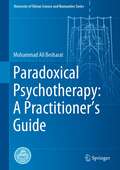- Table View
- List View
Panicology: Two Statisticians Explain What's Worth Worrying About (and What's Not) in the 21st Century
by Hugh Aldersey-Williams Simon BriscoeAre you afraid you might succumb to bird flu? Worried that a life of poverty awaits you in old age? Concerned that you might not be having as much sex as the French? Anxious that our planet is under threat from climate change or a collision with an asteroid? If any, or all, of these things worry you, you're not alone. Anxiety is a part of modern life. But why? We're living longer, safer, and healthier lives than at any time in human history. So what is there to worry about? In this witty and revealing book, Simon Briscoe and Hugh Aldersey-Williams strip away the hysteria that surrounds over forty of today's most common scare stories, from overpopulation and murder rates to fish shortages and obesity levels, and show the extraordinary extent to which statistics are manipulated or misrepresented by vested interests and the media, eager to exploit our fears. And most importantly they offer a toolkit for skepticism-ways of helping readers sort out what really is worth panicking about from the stuff that really isn't.
Panning for Your Client's Gold: 12 Lean Clean Language Processes
by Gina CampbellPsychotherapist David Grove had an insatiable curiosity about how a client subconsciously structures his experience and how change at the subconscious level happens. With a deep respect for the accumulated wisdom in a client's internal world, Grove determined to find ways to keep the facilitator from contaminating the client's experience while fostering self-discovery and self-healing. The result is Clean Language, carefully-worded questions incorporating a client's exact words coupled with strategic processes that create ideal conditions for a client to learn more about himself. The Clean facilitator directs his client's attention, trusting that as the client collects information about his mind and body systems' strengths and weaknesses, insights and confusions, strategies and maladaptations, the system learns from itself, heals, and grows. <p><p> Discover twelve easy-to-learn Clean Language processes that combine the science of emergence and Metaphor Therapy as only creative innovator David Grove could. <p> Clean Language expert Gina Campbell presents twelve Grovian processes for therapists, coun-selors, coaches, and other helping and healing professionals looking for ways to guide their clients in experiential self-exploration. From among the many process Grove developed, Campbell has selected ones that are easy to master and easy to use. You will learn step by step how to facilitate clients to access their inner knowledge and experiences by projecting them onto a drawing or into the surrounding physical space. Spread out before them, your clients'deeper understandings and perspectives readily reveal themselves.
Panorama of the Pandemic: A Phenomenological Inquiry (Academics, Politics and Society in the Post-Covid World)
by Simi Malhotra Ruchi Nagpal Steven S. George Sananda RoyThis volume provides a multi-nuanced analysis of the impact of the Covid-19 pandemic on various aspects of human existence, encompassing societal, economic, and inter-relational dimensions. It highlights a broad range of artistic and literary experiences that unfolded as a consequence of the pandemic or speak to that time.The book revisits pandemic-induced shifts, phenomenologically, including the digitization of art and representations of creativity, “performance” anxiety, socio-political climate determined by “racial algorithms,” gaming surges, employment insecurities, mental health issues from a pedagogical materiality, and the nature of apocalypse through literary reimaginations. It also delves into the global food crisis, reframing of family structures, and local subjectivities as lived experiences.A unique contribution, the book will be useful for students and researchers of cultural studies, digital humanities, mass media, sociology, mental health, psychology, medical anthropology, public health, literature, history of pandemics and epidemics, and South Asian studies.
Panpsychism in the West, revised edition (The\mit Press Ser.)
by David SkrbinaAn updated edition of a comprehensive study of the theory that mind exists, in some form, in all living and nonliving things.In Panpsychism in the West, the first comprehensive study of the subject, David Skrbina argues for the importance of panpsychism—the theory that mind exists, in some form, in all living and nonliving things—in consideration of the nature of consciousness and mind. Panpsychism, with its conception of mind as a general phenomenon of nature, uniquely links being and mind. More than a theory of mind, it is a meta-theory—a statement about theories of mind rather than a theory in itself. Panpsychism can parallel almost every current theory of mind; it simply holds that, no matter how one conceives of mind, such mind applies to all things. After a brief discussion of general issues surrounding philosophy of mind, Skrbina examines the panpsychist views of philosophers from the pre-Socratics to the post-structuralists.The original edition of Panpsychism in the West helped to reinvigorate a neglected and important aspect of philosophic thinking. This revised edition offers expanded and updated material that reflects the growth of panpsychism as a subdiscipline. It covers the problem of emergence of mind from a non-mental reality and the combination problem in greater detail. It offers expanded coverage of the pre-Socratics and Plato; a new section on Augustine; expanded discussions of Continental panpsychism, scientific arguments, Nietzsche, and Whitehead; and a new section on Russellian monism. With this edition, Panpsychism in the West will be continue to be the standard work on the topic.
Panther
by David OwenLife isn't going terribly well for Derrick; he's become severely overweight, his only friend has turned on him, he's hopelessly in love with a girl way out of his league, and it's all because of his sister. Her depression, and its grip on his family, is tearing his life apart. When rumours start to circulate that a panther is roaming wild in his south London suburb, Derrick resolves to turn capture it. Surely if he can find a way to tame this beast, he'll be able to stop everything at home from spiraling towards disaster? Panther is a bold and emotionally powerful novel that deals candidly with the effects of depression on those who suffer from it, and those who suffer alongside them.
Panther
by David OwenLife isn’t going terribly well for Derrick; he’s become severely overweight, his only friend has turned on him, he’s hopelessly in love with a girl way out of his league, and it’s all because of his sister. Her depression, and its grip on his family, is tearing his life apart. When rumours start to circulate that a panther is roaming wild in his south London suburb, Derrick resolves to turn capture it. Surely if he can find a way to tame this beast, he’ll be able to stop everything at home from spiraling towards disaster? Panther is a bold and emotionally powerful novel that deals candidly with the effects of depression on those who suffer from it, and those who suffer alongside them.
Paolo Bozzi’s Experimental Phenomenology
by Richard Davies Ivana BianchiThis anthology translates eighteen papers by Italian philosopher and experimental psychologist Paolo Bozzi (1930-2003), bringing his distinctive and influential ideas to an English-speaking audience for the first time. The papers cover a range of methodological and experimental questions concerning the phenomenology of perception and their theoretical implications, with each one followed by commentary from leading international experts. In his laboratory work, Bozzi investigated visual and auditory perception, such as our responses to pendular motion and bodies in freefall, afterimages, transparency effects, and grouping effects in dot lattices and among sounds (musical notes). Reflecting on the results of his enquiries against the background of traditional approaches to experimentation in these fields, Bozzi took a unique realist stance that challenges accepted approaches to perception, arguing that experimental phenomenology is neither a science of the perceptual process nor a science of the appearances; it is a science of how things are. The writings collected here offer an important resource for psychologists of perception and philosophers, as well as for researchers in cognitive science.
Paperback Therapy: Therapist-approved tools and advice for mastering your mental health
by Tammi MillerThis book is not a substitute for therapy … but it will give you the skills you need to help you meet your mental health goals. Most of us could probably be doing more to take care of our mental health, whether by learning to manage stress and sadness or just by reconnecting with ourselves. But finding the time and money for professional therapy isn&’t always possible – and this interactive guide provides an invaluable first step. While not a substitute for therapy, this book will give you the tools you need to make positive changes in your life and improve your mental wellbeing. In Paperback Therapy, certified practising counsellor Tammi Miller takes you on a journey of self-discovery and healing. You&’ll learn over 25 therapist-approved tools for everything from how to boost your self-esteem and live by your values to techniques for overcoming unhealthy habits and managing anxiety. With prompts and exercises proven to benefit your mental health and wellbeing, Paperback Therapy will help you discover a happier, healthier you.
Paperweight
by Meg HastonIn the vein of Laurie Halse Anderson's Wintergirls, this emotionally haunting and beautifully written young adult debut delves into the devastating impact of trauma and loss.Seventeen-year-old Stevie is trapped. In her life. In her body. And now in an eating-disorder treatment center on the dusty outskirts of the New Mexico desert. Life in the center is regimented and intrusive, a nightmare come true. Nurses and therapists watch Stevie at meal time, accompany her to the bathroom, and challenge her to eat the foods she's worked so hard to avoid. Her dad has signed her up for sixty days of treatment. But what no one knows is that Stevie doesn't plan to stay that long. There are only twenty-seven days until the anniversary of her brother Josh's death--the death she caused. And if Stevie gets her way, there are only twenty-seven days until she, too, will end her life.Paperweight follows Stevie's journey as she struggles not only with this life-threatening eating disorder, but with the question of whether she can ever find absolution for the mistakes of her past...and whether she truly deserves to.
Para Onde Quer Que Vás, Aí Estarás
by Jon Kabat-ZinnUm livro fundamental para sintonizar a mente com o coração, da autoria da maior referência na ciência do mindfulness. «Seja o que for que lhe tenha acontecido, já aconteceu. E a pergunta importante é: como lidar com isso? Por outras palavras: “Então, e agora?”» Publicado originalmente há mais de vinte anos, este continua a ser um dos mais importantes livros sobre o coração da meditação budista: prestar atenção de uma forma especial e objetiva no momento presente e sem julgar. O Dr. Jon Kabat-Zinn divide o livro em três partes: a conceptualização do mindfulness; a prática formal da meditação; e, finalmente, as aplicações na vida quotidiana.Nesta obra de referência são definidos mecanismos e exercícios de mindfulness que lhe permitirão gerir melhor comportamentos, pensamentos e emoções desafiantes no dia a dia. «Este livro brilha com uma requintada simplicidade e franqueza. Jon Kabat-Zinn é um dos melhores professores de mindfulness que alguma vez conhecerá.» Jack Kornfield, professor budista e autor bestseller internacional «Os historiadores do futuro podem bem concluir que a introdução da meditação no mundo ocidental é um dos acontecimentos mais importantes do século xx e que Jon Kabat-Zinn foi um dos seus mais eficazes apoiantes.» Roger Walsh, professor de Psiquiatria, Filosofia e Antropologia na Universidade da Califórnia em Irvine
Parables for the Virtual: Movement, Affect, Sensation
by Brian MassumiAlthough the body has been the focus of much contemporary cultural theory, the models that are typically applied neglect the most salient characteristics of embodied existence--movement, affect, and sensation--in favor of concepts derived from linguistic theory. In Parables for the Virtual Brian Massumi views the body and media such as television, film, and the Internet, as cultural formations that operate on multiple registers of sensation beyond the reach of the reading techniques founded on the standard rhetorical and semiotic models. Renewing and assessing William James's radical empiricism and Henri Bergson's philosophy of perception through the filter of the post-war French philosophy of Deleuze, Guattari, and Foucault, Massumi links a cultural logic of variation to questions of movement, affect, and sensation. If such concepts are as fundamental as signs and significations, he argues, then a new set of theoretical issues appear, and with them potential new paths for the wedding of scientific and cultural theory. Replacing the traditional opposition of literal and figural with new distinctions between stasis and motion and between actual and virtual, Parables for the Virtual tackles related theoretical issues by applying them to cultural mediums as diverse as architecture, body art, the digital art of Stelarc, and Ronald Reagan's acting career. The result is an intriguing combination of cultural theory, science, and philosophy that asserts itself in a crystalline and multi-faceted argument. Parables for the Virtual will interest students and scholars of continental and Anglo-American philosophy, cultural studies, cognitive science, electronic art, digital culture, and chaos theory, as well as those concerned with the "science wars" and the relation between the humanities and the sciences in general.
Parables of Sun Light: Observations on Psychology, the Arts and the Rest
by Rudolf ArnheimThe book will be a joy to ramble through for all lovers of Arnheim's work, and indeed for anyone who shares Arnheim's contagious interest in the order that lies behind art, nature, and human life. It is a seedbed of ideas and observations in his special fields of psychology and the arts.
Paradigms Lost: Fighting Stigma and the Lessons Learned
by Norman Sartorius Heather Stuart Julio Arboleda-FlorezThe book challenges key paradigms currently held about the prevention or reduction of stigma attached to mental illness using evidence and the experience the authors gathered during the many years of their work in this field. Each chapter examines one currently held paradigm and presents reasons why it should be replaced with a new perspective. <P><P>The book argues for enlightened opportunism (using every opportunity to fight stigma), rather than more time consuming planning, and emphasizes that the best way to approach anti-stigma work is to select targets jointly with those who are most concerned. The most radical change of paradigms concerns the evaluation of outcome for anti-stigma activities. Previously, changes in stigmatizing attitudes were used as the best indicator of success. Paradigms Lost and its authors argue that it is now necessary to measure changes in behaviors (both from the perspective of those stigmatized and those who stigmatize) to obtain a more valid measure of a program's success. Other myths to be challenged: providing knowledge about mental illness will reduce stigma; community care will de-stigmatize mental illness and psychiatry; people with a mental illness are less discriminated against in developing countries. <P><P>The book concludes by describing key elements in successful anti stigma work including the recommended duration of anti-stigma programmes, the involvement of those with mental illness in designing programmes, and the definition of programmes in accordance with local circumstances. A summary of weaknesses of currently held paradigms and corresponding lists of best practice principles to guide future anti-stigma action and research bring this insightful volume to an apt conclusion.
Paradigms and Fairy Tales: Volume 1
by Julienne FordThis book is an introduction to the epistemology and practice of social science. It provides an exposition and critique of the ideology and practice of social science, and an examination of the professional social scientist as a manipulator of ideas and appearances.
Paradigms in Psychoanalysis: An Integration
by Marco BacciagaluppiThis book aims at making explicit the scientific theories, termed paradigms, that the author has found useful in psychoanalysis. It lists nine paradigms: genetics, neurobiology, attachment theory, infant research, trauma, their relational model, the family system, the socio-cultural level, and prehistory. These nine paradigms are presented in as many chapters. Special attention is devoted to attachment theory, which the author considers to be the most powerful conceptual tool at the disposal of the psychoanalyst. He also covers trauma, the relational model - with special reference to Ferenczi, Bowlby and Fromm. He explores the effect of cultural evolution, with the advent of agriculture, on family and character structures and the resulting discontinuity with the individual, or group's inborn needs, giving rise to an unnatural environment, and thus to psychopathology and pathology at a social level, such as war. The consequence of these combined factors gives rise to the need for psychotherapy, this is explored, together with the role of the therapist and the therapy of psychoses,
Paradigms in Theory Construction
by Luciano L'AbateWithin the field of psychology there is a proliferation of paradigms, theories, models, and dimensions without an underlying conceptual framework or theory. This conclusion has been reached by representatives of many different psychological specialties. In response to this inconsistency this book presents a hierarchical framework about important theoretical issues that are present in psychological thinking. These issues concern definitions of three major theoretical concepts in theory and practice: (a) paradigms, (b) theories, and (c) models. It focuses on defining, comparing, and contrasting these three conceptual terms. This framework clarifies differences among paradigms, theories, and models, terms which have become increasingly confused in the psychological literature. Paradigms are usually confused with theories or with models while theories are confused with models. Examples of misuses of these terms suggest the need for a hierarchical structure that views paradigms as conceptual constructions overseeing a variety of psychological theories and verifiable models.
Paradigms of Clinical Social Work
by Rachelle A. DorfmanThis fully-integrated volume written by the leading experts in the field of social work presents a wide rage of therapeutic paradigms. Especially noteworthy is the common framework provided for all paradigms discusse, thus facilitating comparison and contrast between each approach. These paradigms include cognitive, brief-oriented, and psychosocial therapies, as well as Adlerian theory and radical behavorism.
Paradigms of Clinical Social Work: Emphasis On Diversity
by Rachelle A. DorfmanThis book provokes sociological questions about the expanding number of paradigms of clinical social work and the application of clinical theory. It enhances clinical social workers' ability to make sense of people's lives so that we may help them in their struggles.
Paradigms of Clinical Social Work: Emphasis on Diversity
by Rachelle A. Dorfman-Zukerman Melinda L. Morgan Phil MeyerDesigned to mirror how social work theory and practice is taught, Paradigms of Clinical Social Work, Volume 3 presents new therapeutic models through an imaginary family experiencing common social work problems.
Paradox And The Family System
by Camillo Loriedo Gaspare VellaFirst published in 1992. Routledge is an imprint of Taylor & Francis, an informa company.
Paradox and Passion in Psychotherapy
by Emmy Van DeurzenParadox and Passion in Psychotherapy , second edition, is a fully updated edition of a classic guide to existential psychotherapy by one of its leading practitioner. Examines the personal and subjective dimensions of psychotherapy in a fresh and bold manner Offers practical and common-sense approaches to tackling sensitive issues when working with clients with an emphasis on transparency and authenticity Weaves together concepts of existential psychotherapy with case studies and the author's experiential observations in a seamless narrative Covers a wide range of intimate existential issues, including loneliness, survival, self-understanding, love, and passion
Paradoxes in Lacanian Psychoanalysis
by Yehuda IsraelyThis book explores the nature of paradoxes in Lacanian psychoanalysis, how they can be approached in treatment and how they can be resolved. Building on Freud’s and Lacan’s own work in resolving paradoxes, Yehuda Israely considers psychic distress, and its amelioration, by means of the study and clarification of the many life situations that can be described as paradoxical. Among the paradoxes examined in this book are the nature of longing (the object’s presence in its absence), the wholeness of the broken heart (the subject’s existence in relation to the lack that defines her or him), drives (the more you feed it, the hungrier it gets) and the pangs of conscience (the righteous suffer). Israely’s innovative approach considers several questions which can be used to orient treatment and focuses on shedding the erroneous beliefs and assumptions that can lead to dead ends. Paradoxes in Lacanian Psychoanalysis also explores those paradoxes – involving anxiety, perplexity, wonder and creativity – that cannot and are not meant to be resolved. This fascinating book will be essential reading for Lacanian psychoanalysts in practice and in training, and for psychoanalysts and psychotherapists of other theoretical backgrounds who are interested in understanding the nature of paradoxes.
Paradoxes of Emotion and Fiction (G - Reference, Information and Interdisciplinary Subjects)
by Robert J. YanalHow can we experience real emotions when viewing a movie or reading a novel or watching a play when we know the characters whose actions have this effect on us do not exist? This is a conundrum that has puzzled philosophers for a long time, and in this book Robert Yanal both canvasses previously proposed solutions to it and offers one of his own.First formulated by Samuel Johnson, the paradox received its most famous answer from Samuel Taylor Coleridge, who advised his readers to engage in a "willing suspension of disbelief." More recently, philosophers have argued that we are irrational in emoting toward fiction, or that we do not emote toward fiction but rather toward factual counterparts, or that we do not have real but only quasi-emotion toward fiction, generated by our playing games of make-believe. All of these proposed solutions are critically reviewed.Finding these answers unsatisfactory, Yanal offers an alternative, providing a new version of what has been dubbed "thought theory." On this theory, mere thoughts not believed true are seen as the functional equivalent of belief at least insofar as stimulating emotion is concerned. The emoter's disbelief in the actuality of components of the thoughts must be rendered relatively inactive. Such emotion is real and typically has the character of being richly generated yet unconsummated.The book extends this theory also to resolving other paradoxes arising from emotional response to fiction: how we feel suspense over what comes next in a story even when we are re-reading it for a second or third time; and how we take pleasure in narratives, such as tragedy, that excite unpleasant emotions such as fear, pity, or horror.
Paradoxes of Gambling Behaviour (Routledge Library Editions: Addictions)
by Willem A. WagenaarWhy does a large proportion of the population engage in some form of gambling, although they know they are most likely to lose, and that the gambling industry makes huge profits? Do gamblers simply accept their losses as fate, or do they believe that they will be able to overcome the negative odds in some miraculous way? The paradox is complicated by the fact that those habitual gamblers who are most aware that systematic losses cannot be avoided, are the least likely to stop gambling. Detailed analyses of actual gambling behaviour have shown gamblers to be victims of a variety of cognitive illusions, which lead them to believe that the general statistical rules of determining the probability of loss do not apply to them as individuals. The designers of gambling games cleverly exploit these illusions in order to promote a false perception of the situation. Much of the earlier interest in gambling behaviour has been centred on the traditional theories of human decision-making, where decisions are portrayed as choices among bets. This led to a tradition of studying decision-making in experiments on betting. In this title, originally published in 1988, the author argues that betting behaviour should not be used as a typical example of human decision-making upon which a general psychological theory could be founded, and that these traditional views can in no way account for the gambling behaviour reported in this book.
Paradoxical Psychotherapy: A Practitioner’s Guide (University of Tehran Science and Humanities Series)
by Mohammad Ali BesharatThis book reports the results of an evidence-based case study for mental disorders which show that PTC has been very successful in bringing about deep and constant therapeutic changes. In response to the need of a more efficient approach for the treatment of psychological disorders, especially the broad spectrum of anxiety disorders, the PTC psychotherapeutic model was developed.Results of the follow-up studies reported in the present book show that the relapse rate in this model is in its lowest level compared to other psychotherapeutic approaches.Simple nature of the PTC protocol, described within the present book, allows psychotherapists and clinical practitioners to use this newly developed psychotherapy model for the treatment of mental disorders.This newly developed psychotherapy model can be applied to new developments in the field of psychotherapy theory, research, and practice.All psychotherapy associations, psychotherapy societies, psychological associations, psychotherapy societies, healthcare organizations, and academic libraries are likely to be part of the readership of this book.
